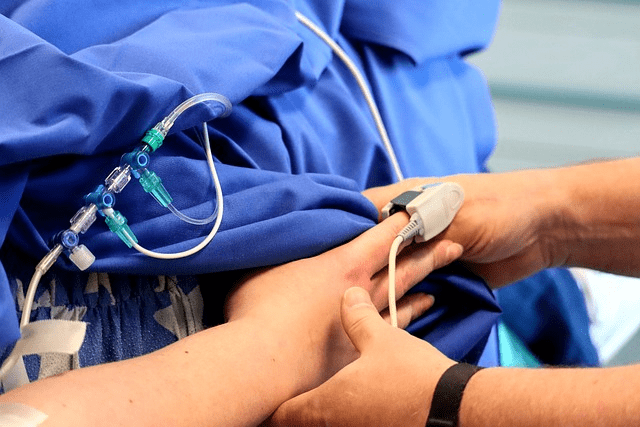How to Increase Your Blood Oxygen Levels for Optimal Health
Increasing your blood oxygen levels is essential for overall health and well-being. Not only can it boost your energy levels and help improve your cardiovascular health, but it can also help reduce the risk of developing certain illnesses such as pneumonia, asthma, and COPD. Here, we’ll discuss what blood oxygen levels are, the potential causes of low blood oxygen levels, as well as ways to naturally increase them in order to maximize your health.Additionally, we will provide ways to regulate your blood oxygen levels and why it is important, how much oxygen is for our health, as well as potential causes of low levels.

What are Blood Oxygen Levels?
Blood oxygen levels, or SpO2, are a measure of the oxygen that is carried throughout our bodies by red blood cells. They are vitally important for maintaining optimal health as inadequate amounts supplemental oxygen can lead to fatigue, dizziness and difficulty breathing. Low levels of oxygen in the blood over extended periods of time can have serious consequences for long-term health if not addressed. Maintaining healthy blood oxygen levels is therefore essential for ensuring good physical and mental wellbeing. Medically reviewed by Danielle Hildreth, RN, CPT, Kimberly Holland they explain in, “Basics Tools for measurement Oxygen levels Symptoms Causes Takeaway People” that people with healthy lungs should have a blood oxygen level of 80-100 mm Hg, or 95-100%, when measured with a pulse oximeter readings.
Keeping your blood oxygen levels at healthy levels is an important part of maintaining overall health and wellness. Oxygen plays a crucial role in many vital bodily functions, such as digestion, respiration, and muscle metabolism. Low oxygen levels can cause fatigue and shortness of breath, which can reduce quality of life and potentially lead to more serious health problems in the long term. By increasing your blood oxygen levels you can optimize your body’s functions, resulting in improved energy levels, higher concentration and focus, and enhanced physical performance.
Blood oxygen levels are measured using a pulse oximeter, which is a device that clips onto your finger or earlobe to measure the oxygen saturation in your blood. It displays a number referred to as “oxygen saturation,” which reflects the percentage of hemoglobin in your blood carrying oxygen molecules. The results of the test are expressed as SpO2, with values of 90-100% being considered normal and anything below 85% being considered low. It is important to note that the accuracy of this blood test itself may be impacted by certain factors such as movement and skin color.
In addition to using a pulse oximeter, you can also have your doctor perform a laboratory test called an arterial blood gas analysis to determine your oxygen saturation level. This test is usually given at hospitals or medical offices and involves taking a sample of arterial blood from an artery in the wrist or arm. During this procedure, a blood sample made of arterial (blood from an artery) is taken and tested in a laboratory for its oxygen content. This test provides more accurate results but is usually only done if deemed necessary by your doctor due to underlying health conditions.
Causes of Low Blood Oxygen Levels
Low blood oxygen levels can be caused by a variety of factors, including poor ventilation, heart and lung diseases, smoking and physical fitness. Poor ventilation causes the air we breathe to contain less oxygen than it otherwise would and can therefore lead to lower oxygen saturation in our bodies. Additionally, any kind of lung disease, or injury that affects our lungs or heart can limit their ability to deliver enough oxygen-rich blood throughout our body resulting in low SpO2. Furthermore, smoking depletes the amount of oxygen available for transport meaning that smokers are more prone to having an inadequate level of SpO2 due to their habit. Finally, physical fitness plays an important role in maintaining healthy blood oxygen levels as exercising regularly helps strengthen our respiratory and cardiovascular systems so they can perform optimally thus ensuring adequate SpO2 levels.
It is also important to note that certain environmental conditions such as high altitudes have been known to cause low blood oxygen levels due to the decrease in available atmospheric oxygen which makes it harder for our bodies absorb enough of oxygen therapy do it through breathing. High altitude sickness is a common symptom experienced by travelers who adjust rapidly from lower altitudes.
Excessive alcohol consumption can definitely have an effect on one’s blood oxygen levels. Alcohol has a direct effect on the lungs, reducing their capacity to transfer oxygen into our bodies. Chronic excessive drinking, for example, can lead to serious damage of our respiratory system as well as irreparable injury to the delicate tissue of the alveoli, which are small air sacs in our lungs that allow for gas exchange and diffusion of oxygen into our bloodstream . Additionally, alcohol reduces muscle strength and coordination which affects breathing rate and efficiency resulting in inadequate delivery of oxygen throughout the body ultimately leading to lower SpO2 levels.
Smoking has a severe impact on blood oxygen levels. Cigarette smoke contains various compounds and chemicals which have a direct negative effect on the cardiovascular system, impairing our body’s capacity to supply sufficient amounts of oxygen to the cells. Additionally, smoking can cause increased bronchial secretion which interferes with the way our lungs are designed to absorb oxygen properly. Consequently, smoking leads to inadequate oxygen levels in our bloodstream making it harder for our bodies to remain at an optimal SpO2 level. Furthermore, nicotine itself can interfere with oxygen transport as well as cause inflammation which further reduces one’s ability to maintain healthy SpO2 levels.
Many people are unaware that exercising can have a significant impact on the overall health of your body, including your blood oxygen levels. When you exercise, your muscles and organs require more oxygen, which causes an increase in blood oxygen saturation levels throughout. This is beneficial as it helps to reduce inflammation, improve circulation and boost energy levels. On the other hand, a lack of exercise can lead to decreased blood oxygen levels, due to the reduced demand for oxygen from your body’s cells. Low blood oxygen levels can cause fatigue and make it difficult for your body to fight off diseases and infections. Therefore, incorporating regular physical activity into your lifestyle is key to increasing your blood oxygen levels and boosting overall health.
A poor diet can also have an adverse effect on your blood oxygen levels. Eating unhealthy, processed foods that are high in saturated fats and added sugars can increase inflammation and create oxidative stress. This puts additional strain on the body, reducing its ability to effectively absorb oxygen from the bloodstream. Additionally, certain vitamins and minerals play a key role in the cells’ ability to take oxygen level produce energy in the form of ATP (adenosine triphosphate). When these nutrients are missing from one’s diet, it limits the cells’ capacity to create energy and thus reduces their ability to use oxygen efficiently. Therefore, eating a balanced diet rich in nutrient-dense foods can help counteract poor dietary habits and keep your blood oxygen levels at optimal levels.
High stress levels can also have a negative effect on blood oxygen levels. When we experience persistent periods of stress, our body releases hormones like cortisol, which increases heart rate, blood pressure and respiration rate. The body does this in order to keep up with the additional demand for oxygen to support the ‘fight-or-flight’ response. While this helps us act instinctively in dangerous situations, it can also lead to decreased oxygen saturation levels in in our blood if experienced chronically. In addition to physical health problems such as fatigue and insomnia, long-term high stress levels can significantly reduce the amount of oxygen circulating throughout our bodies. To ensure optimal health and well-being, one is advised to find ways to manage stress levels and reduce their impact on your body’s oxygen supply.

Summary of what affects our blood oxygen level
There are several lifestyle choices that can lead to lower blood oxygen levels. Inactivity can be a major culprit, as an inactive lifestyle can weaken your lungs and heart leading to reduced oxygen delivery in your body. Additionally, living in polluted environments exposes you to harmful substances which can negatively affect your respiratory system, consequently reducing blood oxygen levels. Similarly, poor dietary choices such as a diet low in fruits and vegetables which are rich in vitamins and minerals can also reduce oxygen saturation level or SpO2 as vitamins and minerals are essential for efficient oxygen delivery throughout the body. Furthermore, smoking reduces the amount of available oxygen in the air we breathe while simultaneously depriving our cells of much-needed essential nutrients to ensure adequate SpO2 levels.
How to Increase Blood Oxygen Levels
Increasing your blood oxygen levels with all-natural supplements is a safe, noninvasive way to maintain optimal health. Certain vitamins and minerals can help boost oxygen levels in your blood, such as magnesium, zinc, Vitamin C, and iron. Magnesium plays an important role in the body’s oxygen absorption and utilization; taking supplemental magnesium can help increase hemoglobin production which, in turn, increases the amount of oxygen circulating in the bloodstream. Zinc helps red blood cells transport oxygen more efficiently and Vitamin C strengthens cell walls which enable them to better absorb and use oxygen. Lastly, iron is essential for healthy red blood cells and can help increase normal blood oxygen levels if taken regularly as part of a balanced diet. Supplementing with these natural ingredients help to ensure that your cells are getting enough of the nutrients they need to keep your blood oxygen levels at normal ranges.
Fulvic acid is a natural mineral-based compound derived from humic substances. It has been found to contain an array of beneficial properties for human health, including the ability to help increase and regulate blood oxygen levels. Due to its antioxidant and anti-inflammatory effects, fulvic acid helps break down and mobilize the oxygen molecules in our cells. This helps optimize oxygen utilization in our bodies, allowing us to more efficiently utilize the oxygen that is already circulating in our bloodstream. Additionally, it can help improve overall circulation by improving the supply of oxygenated blood throughout the body. Studies have found that taking fulvic acid regularly can help reduce symptoms associated with low or unstable blood oxygen levels such as fatigue, poor concentration, and shortness of breath.
A nutrient-rich diet can help increase a person’s blood oxygen levels. Achieving normal blood oxygen levels is essential for optimal health. Eating foods high in antioxidants is a great way to help improve normal blood oxygen levels. Acai berry extract and mulberry extract are two powerful sources of antioxidants that can help boost your blood oxygen levels. Studies have shown that consuming these extracts regularly can help improve the health of your cardiovascular system, as well as increase your overall energy levels. Furthermore, they also contain essential vitamins and minerals that may further contribute to better blood oxygen levels. So if you’re looking for a way to get those blood oxygen level numbers up, it may be beneficial for you to start incorporating acai berry extract and mulberry extract into your diet! Additionally, consuming healthy fats can help boost your blood oxygen levels and provide substantial benefits towards achieving normal levels. Omega-3 fatty acids, found in fish, flaxseed oil and olive oil are some of the best sources of these healthy fats. Studies have shown that consuming omega-3 fatty acids on a regular basis can improve overall health and well being. Furthermore, including these foods in your daily diet may help you reach desired oxygen levels faster and more effectively than just relying on other traditional methods. If you want to take the extra step in reaching optimal health – adding Omega-3s to your daily diet is definitely one way to do it!
Engaging in regular physical activity is an excellent way to increase your blood oxygen levels. Low-impact forms of exercise such as yoga or walking can help get your blood flowing and boost the amount of oxygen that’s circulating throughout your body. Additionally, taking time to practice deep breathing exercises – such as lying down and inhaling through your nose and exhaling through your mouth – can also help you get more oxygen into your bloodstream. Taking time to practice deep breathing exercises is essential when trying to increase your blood oxygen levels. Deep breathing can help move oxygen from the air we breathe into our bloodstream more efficiently. By taking mindful, slow breaths and focusing on each inhalation and exhalation, you can help get more oxygen into your system and achieve a healthier state. You don’t need any special equipment or know-how – just find a quiet space, focus on your breath and relax. With consistent practice, deep breathing can be an easy way to supplement other physical activities in order to keep normal blood oxygen level and reach optimal health! Finally, drinking plenty of fluids throughout the day will ensure that all of the components for increased oxygen are readily available in your system. By following these simple steps, you should be able to improve upon your current blood oxygen levels and reach a healthier state!

What does this mean? Where do I go from here?
Increasing blood oxygen levels for optimal health can be achieved through natural supplements, healthy diet and lifestyle choices. Additionally, regular physical activity, deep breathing exercises and drinking plenty of fluids can all help contribute to higher blood oxygen levels. Incorporating these simple steps into your daily routine can help improve your overall health and quality of life!
Increasing blood oxygen levels is essential for optimal health and well-being. Improving your blood oxygen levels can help you achieve greater energy, clearer thinking and a stronger immune system. By making natural supplements, healthy diet choices, lifestyle changes, engaging in regular physical activity and breathing exercises, as well as drinking plenty of fluids throughout the day, you will be able to maximize your chance of achieving higher blood oxygen levels for improved overall health.

FAQs about blood oxygen level
Q: What are the benefits of increasing my blood oxygen levels? A:Increasing your blood oxygen levels can help boost your energy, reduce fatigue, and improve mental clarity and focus. It can also help improve your overall health by strengthening your immune system, improving digestion, reducing inflammation and increasing longevity.
Q: How do I measure my blood oxygen levels? A:You can measure your blood oxygen levels with a Pulse Oximeter or through a Blood Test at the hospital or medical office.
Q: What healthy habits can I adopt to improve my blood oxygen levels? A: Healthy habits such as exercising regularly, getting enough sleep, managing stress levels and eating nutrient-rich foods can all play an important role in increasing blood oxygen levels.
Q: Are there any nutrient-rich foods that can help increase my blood oxygen levels? A: Yes, nutrient-rich foods like leafy greens, omega-3 fatty acids and certain fruits and vegetables (such as broccoli and kale) are excellent sources of nutrients that can help increase your blood oxygen levels.
Q: Does Fulvic Acid help with increasing my blood oxygen levels? A: Fulvic Acid is thought to help increase the body’s absorption of oxygen by acting as a catalyst to drive more oxygen into the bloodstream.
Q: Is Berry Extract good for improving oxygenation in the body? A:Berry Extract is believed to be beneficial for oxygenation in the body due to its high antioxidant content which helps reduce oxidative stress on cells and tissues resulting in improved circulation of oxygen throughout the body.
Q: What is a Pulse Oximeter and how does it work? A: A Pulse Oximeter is a small device that clips onto your finger which measures the amount of hemoglobin carrying oxygen molecules in your body – referred to as “oxygen saturation”.
Q: When should I have a Blood Test to measure my Oxygen levels? A: Generally speaking it is recommended that you have a Blood Test if you experience any symptoms such as shortness of breath or chest pain that could indicate low blood oxygen levels or underlying health issues related to respiration or cardiovascular function.

